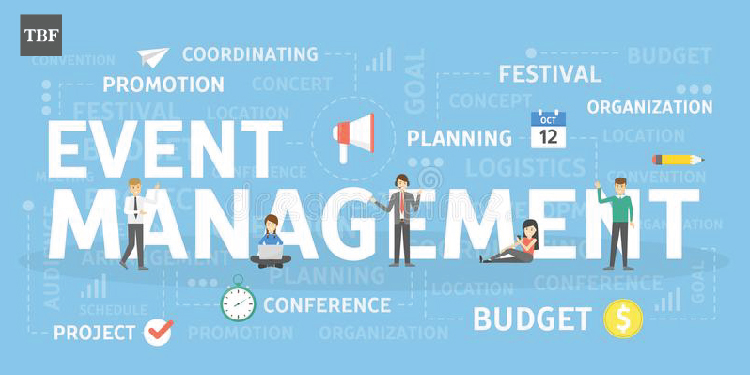Comprehending All About Event Management and Its Role in Effective Events
Event management is a critical consider the execution of successful gatherings. It entails cautious preparation and coordination to assure that every facet lines up with the desired vision. From corporate occasions to social parties, the efficiency of event management can considerably influence participant experience. Understanding the subtleties of this area discloses even more than simply logistics - charlotte event companies. The intricacies of communication, budgeting, and evaluation play important roles fit outcomes. What are the vital components that genuinely drive success?
The Value of Event Management
Event management plays a vital function in assuring the success of any gathering, whether it be a corporate meeting, wedding celebration, or celebration. It includes the planning, company, and implementation of occasions, which requires careful interest to detail and a structured technique. Effective occasion management helps develop memorable experiences for participants, promoting involvement and contentment.
Furthermore, reliable occasion management can enhance source allocation, ensuring that spending plans are complied with while making the most of the influence of the event. It entails coordinating different components such as location choice, distributor management, and logistics, every one of which add to a smooth experience.
Furthermore, efficient occasion management can alleviate potential threats and challenges, getting ready for unforeseen problems that may develop. By focusing on interaction and cooperation among stakeholders, event managers can guarantee that goals are satisfied, leading to successful outcomes and positive comments from individuals. Inevitably, the relevance of occasion management hinges on its capacity to change visions right into truth.
Secret Elements of Event Preparation
In occasion planning, a number of vital components are crucial for success. Budget management techniques, location option pointers, and timeline development essentials form the foundation of an effective plan. Each of these components plays a considerable role in making certain that an occasion runs smoothly and meets its purposes.

Spending Plan Management Methods
Effective spending plan management is a foundation of effective occasion preparation. It includes meticulous allowance of sources to ensure that all facets of the occasion are properly funded. An extensive budget plan should include categories such as place, catering, entertainment, marketing, and backup funds for unexpected costs. To preserve economic control, planners must track expenditures carefully and routinely compare them versus the budget. Using budgeting software can enhance this procedure, offering real-time updates on monetary standing. In addition, acquiring several quotes from vendors can aid determine cost-effective services without jeopardizing top quality. By establishing clear priorities and adhering to a well-structured budget, event supervisors can browse economic obstacles and boost the general success of the event.
Place Choice Tips
Picking the ideal location is crucial for any type of effective event, as it establishes the stage for the general experience. When choosing a venue, event planners ought to take into consideration variables such as location, ability, and ease of access. The location should be quickly reachable for attendees, preferably positioned near transport options. Furthermore, the size must accommodate the anticipated number of guests pleasantly, with room for any kind of planned activities. Organizers must additionally evaluate the venue's services, including audiovisual devices, seating arrangements, and providing choices. Budget restrictions play a significant function; therefore, recognizing the total expenses, including concealed costs, is crucial. Visiting the place beforehand allows for a direct evaluation and assists guarantee it aligns with the event's vision and demands.
Timeline Growth Fundamentals
A well-structured timeline is vital for successful occasion planning, acting as a roadmap that overviews coordinators with each phase of the procedure. Trick parts of timeline growth include establishing due dates for each task, from initial idea to event execution. Organizers should prioritize tasks, such as securing suppliers, validating the venue, and promoting the occasion. Frequently updating the timeline assures that all stakeholders continue to be educated and responsible. Additionally, including buffer times for unforeseen delays can aid preserve overall momentum. It is important to line up the timeline with the event's objectives and sources, enabling efficient allotment of time and budget. Eventually, a well-crafted timeline improves sychronisation and promotes a successful event experience for both coordinators and guests.
The Role of Interaction in Events
Reliable communication is vital in occasion management, ensuring that messaging is clear and consistent. It helps with coordination among different stakeholders, which is important for a smooth implementation. Furthermore, having robust situation interaction strategies in position can significantly mitigate difficulties that may emerge throughout an event.
Significance of Clear Messaging
Clear messaging works as the backbone of effective occasion management, guaranteeing that all stakeholders-- individuals, sponsors, and organizers-- are lined up in their assumptions and understanding. Reliable communication fosters trust fund and transparency, permitting for clear objectives and preferred end results to be articulated. When messages are concise and constant, they decrease the risk of misconceptions and false impressions, which can lead to functional ineffectiveness. Furthermore, clear messaging enhances participant interaction, as individuals are most likely to get in touch with an occasion when they comprehend its function and importance. Additionally, it helps in advertising efforts, making it possible for sponsors to recognize the worth of their financial investment. charlotte event companies. Eventually, clear messaging is vital for producing a cohesive experience read this that reverberates with all included, facilitating the general success of the event
Coordination Among Stakeholders
Effective event management counts heavily on seamless coordination amongst stakeholders, where interaction plays an essential function. Reliable communication warranties that all celebrations, consisting of vendors, sponsors, and group members, are aligned with the event's purposes and timelines. Normal updates and clear regulations promote a collective environment, reducing misunderstandings and boosting efficiency. Stakeholders should develop open networks of interaction, using tools such as e-mails, meetings, and job management software to track development and address worries promptly. Understanding each stakeholder's function and obligations boosts liability, ensuring that jobs are carried out as planned. Ultimately, well-coordinated communication among stakeholders is crucial for navigating the complexities of event planning, resulting in a successful and memorable occasion experience for all included.
Efficient Crisis Communication Approaches
Exactly how can event managers assure that they are gotten ready for unanticipated challenges? Effective dilemma interaction approaches are essential for managing unexpected situations during events. To start with, occasion managers must establish clear interaction channels, making specific all stakeholders are notified quickly. Developing a crisis interaction plan in advance enables swift activity, outlining functions and responsibilities. In addition, educating personnel to reply to situations makes certain that the group is geared up to deal with emergencies effectively.
Using numerous interaction platforms, such as social networks, email, and public statements, aids reach varied audiences swiftly. Normal updates throughout a crisis keep transparency and construct trust Look At This fund among guests. Eventually, proactive planning and clear interaction can substantially reduce the adverse effect of crises, bring about successful event management, even in challenging conditions.
Budgeting and Financial Management
Budgeting and financial management are essential components of reliable event planning, as they regularly identify the total success of the event. A well-structured budget plan works as a roadmap, laying out awaited expenditures and income streams. This financial plan aids event supervisors allocate sources effectively and avoid overspending.
Crucial element of budgeting consist of location expenses, food catering, home entertainment, advertising, and staffing. Each expense should be thoroughly estimated and kept an eye on throughout the planning process. Financial management additionally includes monitoring revenue sources, such as ticket sales and sponsorships, to guarantee monetary feasibility.
Regular economic reviews allow event coordinators to change their techniques as required, mitigating risks linked with unanticipated prices. By maintaining clear monetary documents, occasion supervisors can demonstrate accountability to stakeholders and enhance future preparation initiatives. Inevitably, efficient budgeting and financial management lay the foundation for supplying memorable occasions while accomplishing business objectives.

Logistics and Operational Planning
A well-structured budget plan prepares for reliable logistics and functional preparation in event management. It makes it possible for event organizers to assign resources efficiently, making sure that all logistical aspects line up with the overall vision. Key elements consist of place option, transport arrangements, and equipment procurement. charlotte event companies. Planners should anticipate the requirements of attendees, vendors, and team, making certain seamless control throughout the occasion
Operational planning also includes team jobs and training, ensuring all employee understand their roles. Communication is vital; consequently, establishing clear channels amongst stakeholders lessens misunderstandings. In addition, backup plans for unexpected situations, such as stormy weather condition or technical failings, are crucial to preserve smooth operations.
Ultimately, the success of an event heavily relies upon thorough logistics and operational planning. By focusing on these aspects, organizers can create unforgettable experiences while sticking to spending plan restraints and timelines, therefore attaining business objectives.
Marketing and Promotion Approaches
While efficient logistics and operational planning form this link the backbone of occasion management, successful advertising and marketing and promo methods are crucial for bring in guests and making certain a high degree of engagement. These methods commonly begin with recognizing the target market, which allows event organizers to tailor their messaging and select appropriate communication networks. Utilizing social networks platforms, email advertising, and collaborations with influencers can substantially amplify reach and visibility.
In addition, developing engaging web content such as video clips, blog sites, and graphics can generate passion and exhilaration around the occasion. Early riser ticket offers and promotional price cuts likewise serve as reliable rewards for potential guests. Engaging narration and clear contact us to action are essential in transforming rate of interest right into actual presence. Furthermore, leveraging analytics aids in evaluating the performance of marketing initiatives, enabling organizers to readjust methods in real-time. Collectively, these elements add to a successful occasion that reverberates with its audience.
Assessing Event Success and Feedback
Effective assessment of occasion success and comments is vital for continuous renovation and long-lasting development in event management. This process involves methodically gathering and analyzing data associated with numerous facets of an event, including guest satisfaction, logistical execution, and general effect. Surveys, interviews, and focus teams are usual approaches used to accumulate qualitative and quantitative responses from individuals.
Trick efficiency indicators (KPIs) such as participation numbers, revenue generation, and social networks involvement additionally play an important duty in measuring success. By assessing this info, event supervisors can identify staminas to construct upon and weaknesses to deal with in future events.
Comments enables for changes to be made in real-time, enhancing the guest experience and cultivating loyalty. Ultimately, a detailed assessment procedure not just educates future planning yet also contributes to a more robust online reputation for the occasion management group, guaranteeing sustained success in an affordable landscape.

Regularly Asked Questions
What Certifications Are Required to Become an Event Manager?
To end up being an occasion manager, individuals commonly require a combination of appropriate education, such as a level in hospitality or company management, and functional experience in preparation, arranging, and implementing numerous sorts of events effectively.
Exactly how Do I Pick the Right Place for My Event?
Picking the appropriate place includes assessing the occasion's purpose, capability, location, amenities, and spending plan. A detailed review guarantees that the location straightens with the occasion's goals and enhances the total experience for participants.
What Innovation Devices Are Crucial for Event Management?
Necessary modern technology tools for event management include registration software program, occasion apps, ticketing platforms, job management devices, and analytics software application. These sources streamline planning, enhance participant involvement, and assist in communication, ultimately adding to an effective event experience.
Exactly how Do I Manage Unforeseen Issues Throughout an Occasion?
To manage unforeseen problems during an event, one must continue to be tranquil, assess the situation, interact properly with the group, implement pre-planned backup actions, and adjust swiftly to assure very little disturbance to the total experience.
What Are the current Trends in Event Management?
The latest patterns in event management include digital and hybrid layouts, sustainability practices, individualized attendee experiences, enhanced usage of innovation, and immersive environments. These patterns intend to produce even more engaging and unforgettable experiences for participants.